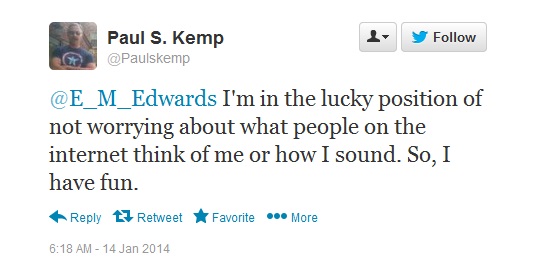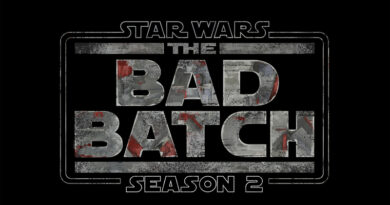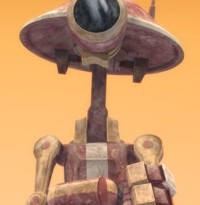What Star Wars Doesn’t Need Right Now
Last week author Paul Kemp, who has written three Star Wars Expanded Universe novels, published a blog post titled “Why I write masculine stories.” The reaction was swift, including Liz Bourke, Deb E. Howell, Cora Buhlert, Kameron Hurley, Chuck Wendig, Sam Sykes, and B. Spencer. [Updated Jan. 20: Additional reactions include Cora Buhlert’s update, which points to Ithiliana, John Wiswell, and Teresa Frohock.] Their responses discussed numerous reasons why Kemp’s post is misguided at best, deeply offensive at worst.
If Kemp were just a random former Star Wars author publicly embarrassing himself on the internet, there would be little reason to add anything further here at FANgirl Blog. Unfortunately, the situation is not that simple. For one, the most recent public statements from Kemp and Del Rey have indicated that he remains under contract to write Star Wars novels, although information on a previously revealed, long-delayed “duology” has been scarce. Kemp’s possible involvement in upcoming Star Wars stories means that his views on women, male and female characters, and storytelling are relevant to the future of the franchise. In addition, this is the second instance of a Star Wars creator offending women to come to light in less than eight weeks.
On his blog, Kemp dismissively dispensed with his critics as “drive-by” observers and expressed similar sentiments on Twitter. He closed the comments to his post and made clear his unwillingness to even listen to, much less discuss, the views of those who found his post troubling. Yet he twice edited the post to bolster his position.
Star Wars fans have a lengthy window on Kemp’s storytelling and public persona. Here at FANgirl Blog, the staff has reviewed his Star Wars novels, read a significant number of his non-Star Wars books, and followed his blog, appearances, and social media. Several members of the blog team have a long-running exchange of texts and emails involving variations on the theme “Did you see today’s offensive tweets from Kemp?” Usually the offensiveness shows profound disregard for women. Needless to say, his blog post came as no surprise to us.
Personally I found Kemp’s post so disappointing in part because I expect better from someone with whom I otherwise have much in common. We both grew up in Big Ten country in the upper Midwest. Like Kemp, Dungeons & Dragons and related games were an important part of my teenaged life. We’re fairly geeky, college-educated straight white men. We both attended prestigious law schools, graduating at the turn of the millennium. We’re fathers of elementary-school-age boys. And, of course, we’re both big Star Wars fans. Yet despite all this, I would be hard-pressed to disagree more with Kemp’s blog post if I tried.
Tempting as it might be to argue lawyer to lawyer, point by point, in cross-examining the flaws, fallacies, and absurdities in Kemp’s post, ultimately that would only distract from the important reason I am writing this post: to address why Kemp’s views – and his gleeful rejection of the mere suggestion of trying to empathize with people who have expressed concern in reaction to his post – are harmful to Star Wars.
Long before Kemp so overtly expressed his writing preferences, his problematic take on Star Wars already was apparent. In her review of Crosscurrent, Tricia Barr wrote:
Then there’s the gore – vomit, snot, blood, decapitation, and body parts. … As I read this book, I kept thinking there was a good story in there – but it wasn’t a Star Wars space opera, rather a scifi time travel story. … Unfortunately, the Dramatis Personae truly does reflect the excessively testosterone-washed Star Wars tale that Kemp tells. Even in scenes that include ancillary characters, they’re almost all men; the female characters are mentioned as dancing girls or a victim of a blaster shot. To me, this is not reflective of what George Lucas’ directly supervised work has been trying to accomplish in the last few years, to expand the Star Wars universe to be more inclusive. Kemp is a skilled writer, so it’s a shame he chose to write off appealing to a large segment of the EU fanbase.
In reviewing The Old Republic: Deceived, Linda Hansen-Raj commented:
Aryn Leener is an empath and a Jedi Knight out to avenge her Master, who was slain by Malgus. Aryn is driven by her anger at the Sith, her loss of faith in diplomacy, and her need for revenge. As a woman, Aryn was a character I liked. Her story arc was developed and her actions consistent with her characterization. … My only problem – and this is true for all the Old Republic books I’ve read so far – is that I’d like a woman Jedi Knight who seriously can kick a Dark Lord’s ass in a lightsaber duel!
In his first Star Wars novel, Crosscurrent, Kemp reverted to his baseline and wrote a story with zero significant female characters. Its sequel, Riptide, had three male protagonists and only one adult woman on the Dramatis Personae – whose story arc is a classic example of perpetuating sexist tropes, because her death defeats the principal villain and enables the male protagonists to survive and escape. Deceived included the female Jedi Aryn Leneer as a major POV character, yet her motivations and characterization were essentially interchangeable with Kemp’s male characters. Likely this was intentional; when Linda interviewed Kemp in connection with Deceived’s release, he explained:
Any time you develop a character, the critical thing isn’t sex or gender, it’s internal drama. When you’re dealing with humans, there’s not such a gulf of difference between the way men and women think (and process intense emotions) such that it takes some great leap of imagination to write a female lead character as opposed to a male. There are differences, obviously, but I think any differences that you developed based solely on a character’s sex would likely end up being mostly stereotypical stuff, and stereotypes are useless. They’re just generalizations about populations (and are often wrong).
Apparently stereotypes are no longer useless to Kemp, however, with his blog post stereotyping his own characters to justify his storytelling choices.
In the post, Kemp insisted that “hyper-masculine” (his term) men are “virtuous” (his word). In this regard his perspective echoes that of Harvey C. Mansfield, Jr., the famous – perhaps notorious, depending on whom you ask – conservative icon in political philosophy at Harvard for literally the last half-century, who discussed similar concepts in depth in his controversial 2006 book Manliness. Kemp’s self-proclaimed “pro-women’s rights” and “pro-LGBT rights” positions are easy to stake out in 140-character snippets; it is another thing entirely to use one’s privilege, education, and standing within the boys’ club of science fiction and fantasy writers to actually make a difference – to challenge pervasive sexist notions embedded in centuries’ worth of storytelling by pushing back and questioning tropes in fiction, rather than perpetuating the cycle.
Kemp makes his choice clear when he declares: “These are the kind of stories I write, these are the kind of characters I write about, and those are the reasons why. And that’s that.” Apparently he has little interest in writing any other kind of protagonist, male or female. His body of work, both inside and outside Star Wars, certainly indicates that.
Instead of expressing a willingness to see others’ perspectives, Kemp unrepentantly doubled down on a consequence of his viewpoint: that it will “reinforce some aspects of traditional gender roles.” He provided the following illustration:
Consider another example: A mugger with a knife threatens a husband, wife, and their child. Now imagine two different responses: In one, the husband runs away with the child while the wife remains and fights the attacker. The wife’s behavior is plainly brave and virtuous. The man’s? Cowardly and despicable, not so? Now imagine the husband stays behind to fight while the wife runs away with the child. In this case the husband’s behavior is plainly brave and virtuous. But I think few people indeed would claim that the wife’s behavior was cowardly or despicable. And that’s because the expectations are different.
The response is simple, and quotes Yoda (with slightest different emphasis): “Only different in your mind.”
To explain further, indulge me for a moment in reverting to law professor mode, and playing the modify-the-hypothetical “what if” game with Kemp’s example.
What if the wife is a black-belt martial artist and off-duty police officer, and her husband is a smaller, more physically frail person? Then no, it is not at all cowardly and despicable for him to hustle their child to safety while his wife stands and fights. Likewise, if in that situation she flees with their child and leaves him to fight, then yes, she is cowardly and despicable for doing so.
It seems – not just from his blog post but also from his Star Wars fiction – that the possibility of creating such a scenario is utterly foreign to Kemp. His perception of bravery and cowardice is gendered. That is not the perspective of Star Wars, where Leia and Padmé are also brave; perhaps, at times, even braver than the men.
Another set of variations comes to mind, too, inspired by The Hunger Games: Catching Fire, which recently became the top-grossing movie released in 2013 at the U.S. domestic box office, toppling Iron Man 3 and far surpassing Man of Steel, Fast & Furious 6, Star Trek Into Darkness, and Thor: The Dark World, among others.
What if Johanna stands and fights, while Beetee flees to safety to ensure the coil of wire is secured to blow the arena?
What if Katniss stands and fights to allow Peeta to run to safety? Particularly the book version of Peeta, who has a prosthetic leg?
What if Katniss stands and fights to allow Finnick to scamper away with Mags on his back, because he is the one strong enough to carry her?
Are any of these men cowardly and despicable? Wouldn’t the women surely be cowardly and despicable if they refused to stand and fight in these circumstances, instead leaving that task to the man?
One significant theme of the entire Hunger Games series is that it’s okay for Katniss to choose Peeta – the young man with traits like compassion, empathy, supportiveness, and nurturing – rather than the more traditionally masculine Gale.
Kemp’s narrow-minded vision of hyper-masculine protagonists may be suitable for Conan the Barbarian, or his Fritz Leiber fanfiction starring Egil & Nix, or the Erevis Cale D&D/Forgotten Realms tie-in novels he writes for Wizards of the Coast. What he chooses to write in those stories is between him and his publishers, and between them and their customers.
Kemp’s fictional-reality is not the vision of humanity George Lucas created in Star Wars. Luke Skywalker and Han Solo are not hyper-masculine, nor are Anakin Skywalker and Obi-Wan Kenobi. Leia Organa and Padmé Amidala are strong female characters, but they are hardly gender-swapped hyper-masculine warriors, either. When Star Wars fans purchase Star Wars stories, they expect characters who are true to the franchise and its values – not the idiosyncrasies and prejudices of individual authors. Star Wars stories should be breaking ground the way Princess Leia set a new bar in the Original Trilogy; they should not be regressing female characters, reinforcing traditional gender roles, or repeating misogynist and negative tropes developed over centuries of sexist storytelling in the past.
For his part, Kemp appears to wish to remain willfully indifferent to how his storytelling and his public persona will be received by others. At the Wizards of the Coast website, he previously included the following segment at the end of his author biography, which not only is troubling for its gender implications, but also problematically appropriates the persona of a prominent African-American character:
Earlier this week, Kemp tweeted the following:
While he may be content to make that choice with his Egil & Nix books and even the prospect of future Erevis Cale novels, it seems unlikely that Lucasfilm and Disney regard their paying customers, former customers, and potential customers with such derision.
Imagine if J.J. Abrams, Lawrence Kasdan, or Dave Filoni publicly pronounced their support for views like Kemp’s. How would the fandom, the media, and the public at large react? What would be Disney’s position? Many authors still seem to subscribe to the notion that they are not accountable to their customers or clients in the way any other professional would be.
One thing I have learned over the years as a member of the FANgirl community is that we let our entertainment dollars do the talking. I expect many of us, including me, will not be spending any of them on Star Wars written by Paul Kemp. And if his duology is still in the mix, we will be reviewing it with a knowledgeable eye.
Related posts:
- Mixed Messages – Time Travel, Dramatis Personae, and Mercenaries
- On Brian Wood, Being a Professional, and Better Futures For Con-Going Daughters
B.J. Priester is editor of FANgirl Blog and contributes reviews and posts on a range of topics. A longtime Star Wars fandom collaborator with Tricia, he edited her novel Wynde and is collaborating with her on several future projects set in that original universe. He is a law professor in Florida and a proud geek dad.
- BJ Priester Talks The Acolyte Episode 6 on Who’s the Bossk? - July 7, 2024
- Dave Filoni Talks Writing AHSOKA and Guiding the Future of Star Wars Storytelling - June 21, 2024
- Lessons in Franchise Management – MCU: The Reign of Marvel Studios - January 14, 2024













Pingback:The Latest on the current Genre Debates | Cora Buhlert
I attempted to read all of those blog posts, but eventually, you just have to say:
Mr. Kemp is just looking for attention like any other bully. What he said in those edit additions are the most condescending, narcissistic garbage I have seen outside of fiction, and anyone who reads his article or his books is just feeding his Sarlacc sized ego. He isn’t worth your thoughts or your feelings, let alone your time.
Pingback:Franchises, Fandom and Protecting The Brand Message « fangirlblog.com
Pingback:Diversity Wins At The 2014 Hugo Awards « FANgirl Blog
Pingback:Separating the Art from the Artist: Why I’m Torn About Lords of the Sith | Tosche Station
Pingback:How to Be Wrong | Eleven-ThirtyEight
Pingback:Gwendoline Christie Talks Captain Phasma and Diversity | FANgirl Blog